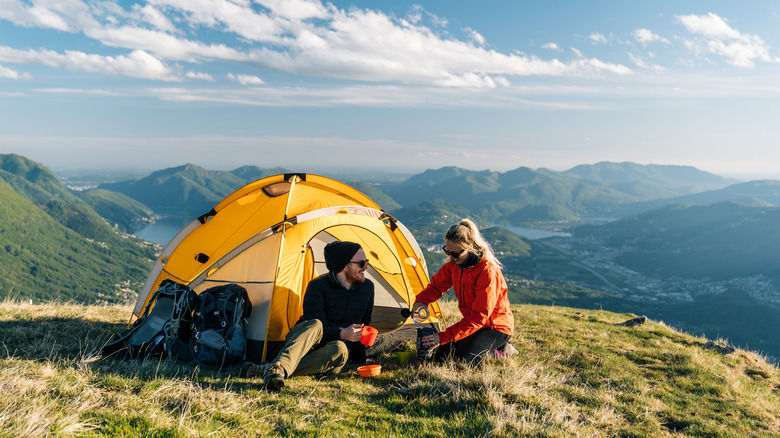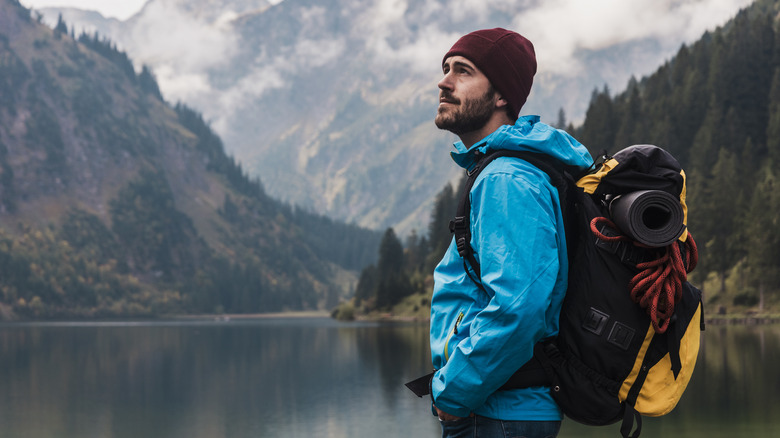One Popular And High-Quality Type Of Camping Tent Poses A Major Downside For Backpackers
Carefully packing all of your gear and supplies, lacing up your boots, and heading out on a backpacking adventure is one of the best ways to shake off the feelings of monotony and getting stuck in a routine. As a hiker, a backpacking and camping trip puts you at the center of nature — one where you're able to disconnect and give in to the wilderness. That said, before you can even think about hitting the trails and choosing your bucket list-worthy camping destination, there's one major decision you need to consider: which tent you'll bring along for the ride.
There are so many options out there — think dome tents, tunnel tents, and even multi-room tents. However, there's a particular one that stands out above the rest: geodesic and semi-geodesic tents. Unlike simple dome tents that use two crossing poles, these specialized designs incorporate multiple poles that intersect to form supports across the tent surface. This ultimately creates a structure that's exceptionally strong, durable, and stable. Better yet, it creates a reliable shelter that's able to withstand some pretty extreme weather conditions a lot better than most other portable camping tents out there.
However, despite all of these benefits, geodesic tents still have some pretty significant disadvantages that can get in the way of you and comfort as a backpacker. After all, the same features responsible for their incredible weather resistance and durability are, unfortunately, also the cause of inconveniences. Specifically, the fact that these types of tents are so much heavier compared to their traditional counterparts, which means they're a hassle to carry and transport — especially if you're planning on doing a lot of walking.
The downside to buying a geodesic tent
The primary drawback of geodesic tents is their weight. Despite their reputation as high-performance equipment, many geodesic models actually add too much bulk to a backpacker's load. This means that you'll end up facing a difficult trade-off between protection and portability if you're forced to carry one of these around on a long-distance hiking trip.
Along with their weight, the actual process of setting up a geodesic tent is another challenge for backpackers. Learning how to successfully pitch a geodesic tent takes practice and patience, and it might not be the right choice if you're hoping for something that's a little easier to assemble after a long day of being on your feet. This is especially true if you arrive at your campsite once it's starting to get dark and are forced to work out exactly what goes where with minimal visibility. And at the end of the day, for occasional backpackers or for travelers exploring mild environments, all of these drawbacks and limitations simply don't justify the investment.
Choosing the right tent for you
When it comes to choosing the right tent for your next camping and backpacking trip, there are a few things you'll want to consider. For starters, where and when you're going to camp plays a big role in your decision. For mild conditions with occasional rain, simpler tent designs like A-frames or dome tents generally offer enough protection without the excess weight. If you're expecting challenging weather (like snow or storms), more specialized options might justify their drawbacks.
Beyond weather resistance, it's also worth thinking about things like setup and space. If you're a first-timer, you might want to look into tent styles that are quick to set up with minimal components to help make tent camping a lot less intimidating. For example, pop-up tents offer nearly instant shelter thanks to their spring-loaded design. And although these user-friendly options might sacrifice some stability in extreme conditions, they're generally a great choice for newcomers who are just getting started in the world of outdoor camping.
Lastly, it's also important to keep in mind how often you'll use your tent, as well as how much of an initial investment you're willing to make. Occasional campers exploring gentle terrains might find specialized geodesic designs completely unnecessary. Instead, dome tents offer a practical middle ground with decent weather protection, reasonable weight, and simpler assembly. Plus, they also tend to be a lot more affordable, which means you won't have to worry about losing out on too much if you end up realizing that camping just isn't your vibe.


